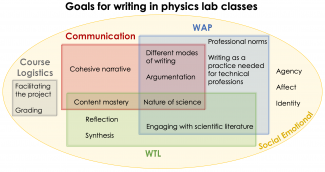Writing is an integral part of the process of science. In the undergraduate physics curriculum, the most common place that students engage with scientific writing is in lab classes, typically through lab notebooks, reports, and proposals. There has not been much research on why and how we include writing in physics lab classes, and instructors may incorporate writing for a variety of reasons. Through a broader study of multiweek projects in advanced lab classes, we have developed a framework for thinking about and understanding the role of writing in lab classes. This framework defines and describes the breadth of goals for incorporating writing in lab classes, and is a tool we can use to begin to understand why, and subsequently how, we teach scientific writing in physics. A diagram of the framework is shown at left (click to enlarge). We have used this framework to (a) conduct a multiple case study analysis of the ways in which writing was implemented in three different project-based advanced lab courses and (b) investigate students' views about, and experiences with, writing in their physics lab courses.
Addressing Various Goals for Writing in Lab Classes
The framework contains 15 possible goals for writing in lab classes, organized into 5 distinct categories.
Communication: One common approach to scientific writing emphasizes that the primary purpose is for the writer to demonstrate to a reader what they know or what they did. Lab courses may have goals around helping students develop clear and effective communication skills, including being able to write a cohesive narrative about an experiment or construct a convincing argument.
Writing as professionalization (WAP): Writing is a professional activity of scientists, and many lab courses seek to teach students about discipline specific norms, practices, and skills related to written communication. Through engaging in writing in a physics lab class, students may learn and adopt professional discourse norms, practice disciplinary forms of reasoning or argumentation, and come to understand the central role that written communication plays in the process of science.
Writing to learn (WTL): A WTL approach considers writing as a tool for facilitating thinking and learning, and focuses on the process of writing rather than the final product. Instructors may engage students in reflective writing or focus on the iterative process of revising writing in order to help students learn both content and practices of physics.
Course logistics: The practical reality of physics lab classes is that writing assignments can play a crucial role in the structure of the class, allowing students to successfully complete experiments and instructors to successfully guide and evaluate the students’ work.
Social emotional: Writing can play a role in supporting or facilitating students' personal experiences in the social environment of a lab course. Engaging in written communication may help students exercise agency over their own learning or develop a sense of identity as a physicist.
Students' Views and Experiences of Writing
Learning about, and engaging in, authentic disciplinary practices around written communication can be an important aspect of students' physics education, particularly in lab courses. In the context of project-based advanced lab courses, our research investigates students' views about the role of writing in experimental physics and their experiences with various forms of written communication in physics. From an analysis of students’ weekly reflections over the course of one semester, we find that students think about writing in a variety of ways and that the context and framing of a lab course may impact student thinking about the purpose of writing in science.



 The Physics Frontiers Centers (PFC) program supports university-based centers and institutes where the collective efforts of a larger group of individuals can enable transformational advances in the most promising research areas. The program is designed to foster major breakthroughs at the intellectual frontiers of physics by providing needed resources such as combinations of talents, skills, disciplines, and/or specialized infrastructure, not usually available to individual investigators or small groups, in an environment in which the collective efforts of the larger group can be shown to be seminal to promoting significant progress in the science and the education of students. PFCs also include creative, substantive activities aimed at enhancing education, broadening participation of traditionally underrepresented groups, and outreach to the scientific community and general public.
The Physics Frontiers Centers (PFC) program supports university-based centers and institutes where the collective efforts of a larger group of individuals can enable transformational advances in the most promising research areas. The program is designed to foster major breakthroughs at the intellectual frontiers of physics by providing needed resources such as combinations of talents, skills, disciplines, and/or specialized infrastructure, not usually available to individual investigators or small groups, in an environment in which the collective efforts of the larger group can be shown to be seminal to promoting significant progress in the science and the education of students. PFCs also include creative, substantive activities aimed at enhancing education, broadening participation of traditionally underrepresented groups, and outreach to the scientific community and general public.